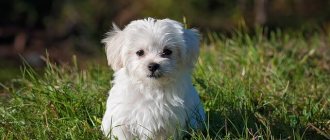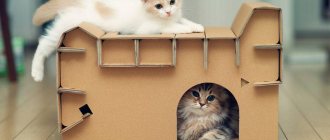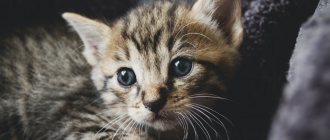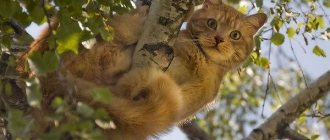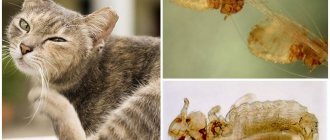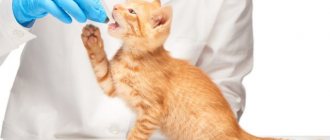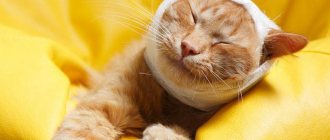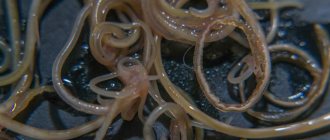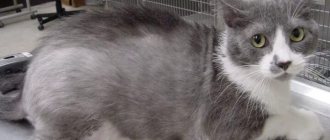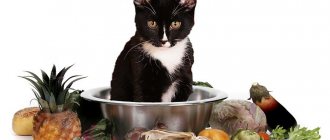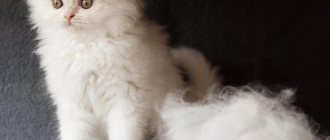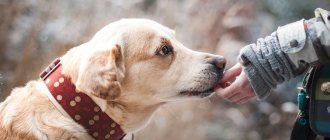13049Administration
1
For a cat, vitamins against hair loss are not a whim or a whim, but a necessity and a guarantee of a beautiful, shiny coat. For the owner, this is a solution to the problem that most pet owners face: hair scattered everywhere, which makes the home untidy, gets into the lungs and stomach, causing damage to the health of both people and the cat itself.
Therefore, it is better to take care of vitamins, even if you have to spend a little money, than to endure such troubles. This article discusses exactly what substances a cat’s fur needs, what medications veterinarians advise to give, and what to feed the animal so that its coat looks “A+.”
© shutterstock
Which vitamins are deficient in cats and can cause hair loss?
The cat's body urgently needs all vitamins and microelements to one degree or another. But the following substances are most required for your pet’s fur and skin:
- vitamins of group B, A, E, D;
- sulfur, iodine, zinc, calcium;
- fatty acids – Omega-3, Omega-6.
B vitamins help improve the function of the digestive organs, significantly strengthen muscle tissue, improve the general well-being of the cat, and prevent hair loss. B6, which helps the production of taurine, improves metabolic and energy processes in the pet's body. A lack of taurine leads to pathologies of the cardiovascular system, digestive tract, problems with the liver and kidneys. This significantly affects the condition of the cat's coat.
B7 (biotin) is part of many enzymes. It is better to use it with sulfur. It regenerates the skin, fights hair loss, strengthens the animal’s nervous system, and regulates protein and fat balance. The lack of biotin leads to inflammatory processes in the hair follicles, causing hair loss. B vitamins are found in foods such as pork, beef, poultry, fish, liver, carrots, potatoes, egg yolks, and fermented milk dishes.
We recommend reading: Potatoes: beneficial properties and contraindications
Vitamins of group A take care of the thickness and shine of the cat's coat and increase immunity. Contained in liver, offal, eggs, pumpkin, carrots, sweet peppers, spinach.
We recommend reading: Chili peppers: benefits and harms, properties, how to eat them
Vitamin E ensures full growth of the cat's fur and increases resistance to various infections. Contained in oils, salmon and some other types of fish, dairy products.
We recommend reading: Benefits of bell pepper, properties
Cats can lose hair for a number of other reasons:
- Seasonal shedding. Twice a year cats experience intense hair loss - in spring and autumn. In this way, animals change their “coat” to a new one, more suitable for the coming season.
- Diet. Incorrectly selected food, food from a common table, food devoid of minerals and vitamins will sooner or later lead your pet to vitamin deficiency. The cat's fur will be the first to react to this. Diet is the most common cause of hair loss.
- Often, various diseases affect the appearance of the coat. The causes may be helminthic infestations, fungal diseases, allergies and other pathologies that lead to hair loss.
In all these cases, you should purchase vitamin complexes for your pet to keep the coat in order and prevent its loss.
Causes of severe hair loss in cats
Cats can lose hair for physiological and pathological reasons. In the first case, we are talking about a natural process in which you should not worry about the health of your pet. Physiological hair loss goes away on its own. At the same time, the animal looks quite healthy, does not lose its appetite and remains alert.
If the cause of molting is a pathological factor, then the condition of the skin often changes. In addition, the cat loses activity, may refuse food and hide in corners. If this happens, it is important to consult a doctor immediately.
Hair loss in cats can be caused by diseases
Attention! If your pet has a lot of hair loss, he becomes lethargic, eats little and has a dry and warm nose, then this may signal a pathological process occurring in the body. In this case, the cat must be taken to a veterinary clinic without waiting for life-threatening complications for the animal.
Why hair may fall out - video
Natural shedding
Active hair loss occurs during the shedding season, which occurs in spring and autumn. At the same time, the animal feels quite good. His coat is gradually renewed. This process causes a lot of inconvenience to the owners, but does not affect the pet’s health in any way. The skin does not change its normal color and remains pale pink.
An animal can also shed during pregnancy, as changes occur in the cat’s body. In addition, during this period immunity decreases, which can enhance this physiological process. Hair loss is also possible during lactation, since a large amount of vitamins and other nutrients are spent on milk production so that kittens grow strong and healthy.
A nursing cat loses a lot of hair, as vitamin deficiency in the body often occurs during lactation.
The problem can arise in older cats, because the body of this group of pets gradually weakens, which is why hair falls out regularly and out of season. However, active molting in an old animal should not be ignored. Such a pet should be properly fed and cared for.
In order to understand why shedding occurs and whether it is worth contacting a veterinarian, you should look at the appearance of the skin and fur. If there is focal baldness, affecting the eyes and ears, then this indicates the presence of the disease. You should immediately consult a doctor if the skin becomes red, irritated, and the coat becomes dull and unkempt.
My cat had long hair, during the molting period it grew so much that it became scary. They periodically gave the pet vitamins, but also constantly combed it. It is very important to do this, although previously this procedure was not given much importance. The fact is that if you don’t comb the fur, then during licking it gets into the cat’s gastrointestinal tract and can ultimately cause intestinal obstruction. I recommend everyone not to neglect this simple procedure.
What to do when your pet is shedding - video
Pathological loss
Pathological causes of active hair loss in cats:
- Stress. Shedding often intensifies due to nervous overstrain. Stress can be triggered by a sudden change in environment, vaccination, surgery, noisy parties, etc.
- Poor nutrition. A lack of essential vitamins and minerals in your pet’s diet can cause active hair loss.
- Allergy. Hair loss can occur due to a pathological reaction of the cat's body to various components. Allergies can be triggered by improper feeding and the use of poor-quality hygiene products. In this case, the fur may fall out unevenly, and the cat may experience severe itching.
- Taking medications. Active molting can be caused by long-term treatment with antibiotics, glucocorticosteroid drugs and potent agents that are used for application to the skin.
- Parasitic diseases. Hair loss can occur if the pet has worms in its body, as well as if it is infected with fleas, ticks and lice-eaters. Additionally, the animal may experience itching.
- Fungal infections. Microsporia and other diseases similar in etiology often provoke active molting. In this case, baldness often has a focal form. In this case, the fur falls out in clumps, and irritation appears on the skin.
- Bacterial and viral infections. The presence of pathogenic microflora in a pet’s body often leads to severe shedding, since the animal’s defenses are worn out during this period. In addition, there are additional symptoms: increased body temperature, loss of appetite, loss of activity, vomiting and diarrhea.
- Immunodeficiency states. A decrease in the body's defenses often provokes hair loss. At the same time, the pet looks lethargic and is susceptible to various infectious diseases. Deterioration of the immune system occurs with poor nutrition, in the postoperative period and with long-term treatment with antibacterial medications.
- Gastrointestinal diseases. Lesions in the cat's stomach and intestines contribute to poor absorption of vitamins from food, which causes deterioration in the appearance of the cat's fur and its loss. After treatment of the underlying disease, the problem is quickly eliminated.
- Kidney failure. Impaired functioning of the urinary system can contribute to a decrease in immune defense, as well as intoxication of the body. This occurs especially often in chronic renal failure. In this case, the entire body suffers, including the coat.
Fungal diseases in cats can cause hair loss
Attention! Hair falling out in clumps should alert you. If your pet has bald patches on certain parts of its body, this can be caused by ringworm, which is easily transmitted from animal to person.
My friend's cat lost hair on his withers. She didn't attach any importance to this. When I was visiting her, I noticed that the animal also had some kind of sore in this area. Unfortunately, the disease was so advanced that they did not have time to save the cat. I recommend that anyone with focal hair loss in pets immediately contact a veterinarian. Late discovery of the cause may cost the pet's life.
Causes of pathological shedding in kittens
Thinning coats in kittens may be associated with rare hereditary diseases. In this case, a genetic mutation occurs, which can provoke molting, which is not associated with seasonal changes in the pet’s body. If a kitten has this problem, it is important not to self-medicate, because it can cause life-threatening consequences for the animal.
What other factors can contribute to the development of pathology:
- insufficient intake of vitamins from food or mother's milk;
- premature birth;
- infectious diseases.
If a kitten loses hair in large quantities, this may be a sign of insufficient intake of vitamins in the body.
The kittens' body is very sensitive to the slightest external irritants, so a sudden change in food can negatively affect not only the pet's well-being, but also its coat. Therefore, you should not change the animal’s diet unless necessary, and also do not give medications without a doctor’s prescription.
What vitamins are best for cat fur?
Vitamin complexes are intended for cats that are naturally fed. The most common form of release is tablets and liquid solutions. There are also gels, powders, drops, capsules. You should choose them based on your pet’s preferences and in terms of convenience. For example, gel, powder, drops can be disguised in a portion of food. In this case, there will be no need to give them forcibly. Therefore, many owners prefer liquid vitamins for their cats if they have hair problems. In case of serious health difficulties, the veterinarian prescribes vitamins in the form of injections and injections.
Attention! The dosage of vitamin preparations is determined by a veterinarian or the manufacturer’s instructions should be followed. Excess of active substances can be dangerous to your pet's health.
What medications can be given to a cat?
The most common drugs:
- One of the most popular are Cat Felltop Gel vitamins. The substances they contain stop all the problems cats have;
- Canina Cat-Fell OK is also great for helping your furry pet. This drug can be used both as a medicine and as a prophylactic;
- Derm Caps and Derm Liquid are vitamins that allow you to quickly solve all skin problems of your furry pet;
- Laveta Super For Cats. This complex of vitamins is used by breeders when preparing cats for various exhibitions. In addition to biotin, they contain vitamins B and E, as well as taurine. Thanks to this complex, the pet will acquire healthy shiny fur;
- Kitty's + Taurin + Biotin is a treat that contains a storehouse of substances that a cat needs. The owner will not only pamper his pet, but also provide him with everything necessary for health;
- Gimpet Katzentabs. This is a feed additive containing biotin and seaweed. In addition to preventing hair loss, it also has a beneficial effect on the pet’s intestinal microflora;
- Felvit. A drug in which biotin also plays a major role. Its regular use will provide the cat with a healthy body and normal skin pigmentation.
Any of these (and more) vitamin complexes should be taken regularly for at least a month.
If you give your pet the vitamins it needs in a timely manner, you won’t have to worry about the appearance of skin diseases, and the fur will always be healthy and beautiful.
The best vitamins for cat skin and coat
Vitamins “Phytomins” from a domestic manufacturer are suitable for restoring fur in British cats. They contain brewer's yeast, plant extracts, mineral supplements, collagen, taurine and sulfur. Noticeably improves hair growth, strengthens roots, and prevents hair loss. The drug is produced in the form of granules. Can be used for a long period.
Beaphar Kittys Mix is considered a good vitamin for cat fur. This is a complex of vitamins in the form of a treat with different flavors. The product contains all the necessary vitamins for a pet’s healthy coat, as well as a number of microelements. The drug restores the cat's coat, prevents hair loss, improves vision and functioning of the cardiovascular system, and strengthens the condition of the pet's claws and teeth. Among the disadvantages, the increased sugar content is noted.
FeliDerm vitamins from a German manufacturer are designed for the fur and skin of cats during shedding. They also solve more serious problems - allergies, metabolic disorders, hormonal disorders. The composition includes biotin, Omega-3, amino acids, zinc, brewer's yeast. The complex has natural ingredients: algae, flour, meat, liver, egg, whey. The drug relieves skin itching, prevents hair loss, has good taste, is used very economically, but buyers note its high cost.
The drug "Canina Canivita" is produced in the form of a tonic. Suitable for cats of all ages. The effect of using vitamins occurs in the shortest possible time, since the product immediately enters the bloodstream. Recommended for cats with thick, long hair. After a course of treatment, it becomes smooth, stops pilling, acquires shine, and excessive hair loss stops. The drug relieves inflammation of the skin and eliminates itching. In addition, vitamins well regulate the animal’s sexual cycle. The disadvantages include the bitter aftertaste of the drug.
Vitamins "Doctor Zoo" can be used in different forms of nutrition. They contain all the necessary vitamins, as well as phosphorus, potassium, manganese, zinc, and copper. Thanks to the content of taurine and biotin, the condition of the skin and coat is quickly restored, and metabolism is normalized.
“Laveta Super For Cats” is a vitamin complex for cats taking part in exhibitions, including the Scottish breed. Contains vitamins B, E, as well as taurine and biotin, which provide your pet with shiny, healthy coat and skin.
“TM Excel Brewers” - vitamins for those cats with intense hair shedding. Cats change it twice a year. To make the molting period more comfortable for the animal, it is imperative to give the pet vitamin complexes. This preparation contains fatty acids, all essential vitamins and microelements, and extracts of some plants. They prevent dandruff, hair loss, and eliminate hair fragility.
Vitamins "Radostin" from a domestic brand are suitable for sterilized cats against hair loss. Neutered animals also need special care and feeding. The drug contains multivitamins and prebiotics. Indications for use include nutritional problems, hair loss, and preventive measures.
It is worth noting the drug Malta paste. It contains malt extract, oils, fatty acids, and plant products. Designed to remove lost hair from the digestive tract. It has a pleasant taste, effectively combats hair loss, and minimizes seasonal shedding in animals. Available in tubes.
Important! In the process of taking vitamin preparations, it is necessary to carefully monitor their effect on the cat. The products can lead to allergies and other negative reactions in the pet’s body.
What vitamins do pets need?
All the most important processes occurring in the body occur with the participation of vitamins and minerals. With a lack of vitamins (hypovitaminosis) or their excess content (hypervitaminosis), the health and appearance of animals can significantly deteriorate. This rule applies to growing animals, adult cats, and those who are elderly. And in severe cases, the consequences can be irreversible, including death.
Table: main vitamins that affect the health of pets
| Vitamins. | What role do they play? | How does deficiency manifest itself in an animal’s body? | In which products is it present? |
| Retinol (vitamin A). | Necessary for the growth of body cells, increases resistance to infections, improves vision in light of varying intensities. | Appetite worsens, activity decreases, the ability to see in the dark decreases, the coat stops shining and may fall out. Kittens exhibit growth retardation, teeth form more slowly, and diarrhea is possible. | Retinol is present in the greatest quantities in the following products:
|
| Thiamine (vitamin B1). | Affects the metabolic processes of the body, the functioning of the gastrointestinal tract, and has a positive effect on the nervous system. | There is uncertainty in movements, the animal becomes too excitable. Possible vomiting, convulsions, and in particularly severe cases, paralysis. | To obtain thiamine you can consume:
|
| Riboflavin (vitamin B2). | Participates in the metabolism of nutrients in the body, normalizes the functioning of the heart and nervous system. | Appetite worsens, weakness and decreased activity appear, the coat becomes dull and may fall out. | The following products compensate for the lack of riboflavin:
|
| Nicotinic acid (vitamin B3). | Participates in the body's redox processes and metabolism. | Causes digestive system upset and dermatitis. | Nicotinic acid is found in foods of animal and plant origin, including:
|
| Pantothenic acid (vitamin B5). | Required for the metabolism of nutrients, the formation of cholesterol, histamine, hemoglobin, and affects the functioning of the cardiovascular and excretory systems. | Manifests itself in the form of various dermatitis and excessive hair loss. | The lack of pantothenic acid can be compensated for using the following products:
|
| Pyridoxine (vitamin B6). | Participates in protein formation. Especially necessary for kittens and pregnant cats. | The cat may develop anemia, weight loss, impaired functioning of the kidneys and nervous system, including seizures. | The largest amounts are found in liver and yeast, but are also found in meat, dairy and many plant products. |
| Biotin (vitamin B7). | Significantly affects the regulation of protein and fat balance in the body. | Deterioration of the condition of the skin and fur, mucous membranes, anemia, loss of appetite. | The largest amount is found in the liver and kidneys, as well as in legumes. |
| Cyanocobalamin (vitamin B12). | Participates in the process of blood formation, affects the functioning of the liver and nervous system. | Anemia, cramps, lack of coordination, as well as loss of appetite or a desire to eat your own feces. | The following products contain it:
|
| Levocarnitine (sometimes called vitamin B11). | Controls metabolism in the body, influences the proper development of muscle mass (including heart muscle) and the animal’s bones, and improves immunity. | With a lack of levocarnitine, there is a tendency to obesity, the animal quickly gets tired and leads a less active lifestyle. | The body of an adult animal produces this substance in sufficient quantities. Kittens and elderly pets need additional consumption. Found in all types of meat, in smaller quantities in poultry. It is not found in plant foods. |
| Ascorbic acid (vitamin C). | Affects blood formation, increases resistance to viruses. | Diseases of the oral cavity (including scurvy), peeling and cracking of the skin. | There are large quantities of:
However, in the body of healthy cats this vitamin is formed on its own and only kittens, elderly and weakened animals need it. |
| Calciferol (vitamin D). | Regulates the absorption of phosphorus and calcium by the body, affects intestinal function. | A lack of calcium leads to animals gnawing and licking inedible objects, coordination of movement is impaired, problems with the musculoskeletal system and teeth arise, and signs of rickets appear in young animals. | Vitamin D is synthesized in the body under the influence of ultraviolet radiation. If it is not possible to give your cat air baths in the sun, you can use an ultraviolet lamp, but be careful not to cause the coat to fade. To increase this vitamin in the body you can use:
|
| Tocopherol (vitamin E). | It is responsible for the reproductive function of cats, affects the central nervous system, and is a natural antioxidant. | A lack of vitamin can cause infertility or miscarriage in kittens, and worsen the functioning of the heart and liver. | Mainly present in fats of vegetable origin. |
| Phylloquinone (vitamin K). | This substance affects blood clotting, the functioning of the musculoskeletal and circulatory systems. | May lead to bleeding. | It is formed as a result of the vital activity of the domestic cat. But in some situations its use is vital. Rat poison containing wolfarin binds vitamin K, leading to internal bleeding and death of the animal. If a cat has eaten such a poison, it is necessary to induce vomiting as quickly as possible, and then treatment is carried out with injections of vitamin K. With prompt action, the animal can be saved. |
It must be taken into account that an overdose of any vitamin leads to an increased need for another (this is called secondary vitamin deficiency) and harms the body. Vitamins belonging to the fat-soluble class - A, D, E - are necessary in the diet of a pet, but in optimal quantities. Vitamins C and K, as already mentioned, are produced by bacteria present within the body itself. If you provide your pet with the correct diet, and its appearance and behavior do not give cause for concern, then you should not introduce additional vitamins. Excessive amounts of fat-soluble vitamins are stored in reserve rather than excreted from the body, so excess of these vitamins (especially A and D) in pets is more common than their deficiency.
Video: vitamins for cats
In addition to vitamins, pets need to consume a substance such as taurine.
Taurine is a sulfur-containing amino acid found in many mammals, but not cats. Although her body urgently needs this substance:
- taurine is involved in the formation of bile and if it is deficient, problems arise with the absorption and breakdown of fats and fat-soluble vitamins, which can affect both the functioning of the digestive tract and the condition of the pet’s skin and coat;
- it has anticonvulsant activity, affects the functioning of the brain and heart;
- taurine stimulates healing processes, improves immunity;
- affects sugar levels, its deficiency can lead to diabetes;
- lack of taurine causes retinal dystrophy;
- taurine has a positive effect on the ability of females to bear kittens.
While the main source of food for small predators was hunting mice and rats, they did not lack taurine. Now that pets have completely shifted the problem of getting food to their owners, the presence of this amino acid in the animal’s diet must be mandatory. In ready-made feeds of at least premium class, the amount of taurine is quite sufficient. When using a natural diet or economy class feed, it is necessary to additionally introduce this food additive into the food.
Rules for using cat vitamins for fur
In addition to the varied release form, the complexes have a certain concentration of active substances. Therefore, they should be used based on the instructions or the instructions of a veterinarian who will advise the dose and course of administration. For various diseases that require a therapeutic dose, vitamins should be used strictly as directed. They are usually used during inflammatory processes and infectious diseases.
Vitamins that are recommended for preventive use contain a minimal concentration of beneficial substances. It is determined by daily requirement. Their dosage has no therapeutic effect and is prescribed for the prevention of vitamin deficiencies.
Contraindications and side effects
When an excessive amount of active substances enters a cat’s body or there is an individual intolerance to the drug, this leads to an overdose and unpleasant consequences for the animal.
In case of an overdose, a pet may experience:
- hair loss;
- itching and rashes of the skin;
- deterioration or lack of appetite;
- some swelling;
- increased anxiety.
In more serious cases, reproductive function is impaired, and disruptions in the functioning of the heart, liver, and kidneys are observed. You should not overuse vitamins if your cat has cancer, inflammatory processes, or allergic reactions. In such cases, vitamins can harm the animal.
Vitamins should be used with caution in weakened animals with chronic diseases, pregnant and lactating cats. The course of treatment, the vitamin complex, and its composition are agreed upon with a veterinarian, who will select the correct drug based on the pet’s physiological well-being, age, and general health.
Famous brands for the production of vitamins
The modern market offers a large selection of both foreign and domestic products.
Table: a brief overview of the most popular Dutch products)
| Name. | What substances does it contain? | Purpose. | What animals is it intended for? | Dosage. | Price. |
| General strengthening complex Top 10 (shrimp flavor). | Contains the daily requirement of vitamins (A, D3, E, B), and also includes:
| Strengthens the immune system, normalizes vision, reduces the likelihood of skin irritation and disease, makes the coat shiny and well-groomed. | Can be given to kittens and adult cats, including during pregnancy. |
| Pack of 180 tablets - from 730 rub. |
| Malt Paste. | It contains:
| Removing hair from the cat’s body, improving the functioning of the gastrointestinal tract. | During shedding, for long-haired breeds it is recommended constantly. | Once a day, three centimeters of paste is squeezed out of the tube and mixed with food; during the molting period, the norm can be increased by one and a half times. | Depending on the tube size:
|
| Duo Aktive Pasta (two pastes in one tube). | The yellow paste contains vitamins, minerals, Omega-6, taurine. Brown includes the BIO-MOS additive for the formation of healthy intestinal microflora. | Removing toxins, improving intestinal microflora. | It is recommended to use after a course of treatment with antibiotics and deworming. | Three centimeters of paste daily (in severe cases, the norm doubles) | About 570r. |
| Drucal (powder). | He contains:
| Designed to strengthen the musculoskeletal system. | Recommended for weakened animals, as well as those prone to joint diseases. | One scoop (three grams) daily. With severely weakened muscles, you can double it. Mixes with liquid food, kefir. | Packaging 280 grams - from 680 rub. |
| Renaletten. | Minerals (including calcium, phosphorus and levocarnitine), dairy and meat products, eggs. | Normalizes kidney function. | Recommended for elderly animals or those with kidney disease. | From three to six tablets daily, with exacerbation of diseases up to four tablets per kilogram of weight. | From 355 rub. |
| Laveta Super. | Vitamins B, E, H, minerals, taurine, lactic acid. | Improves coat quality, promotes shedding, prevents itching and dandruff. | Used for skin diseases, during molting and for prevention. | Number of drops depending on the weight of the animal:
The course is one month; if the animal is in poor condition, the norm can be tripled in the first week. | Packaging for 50 ml from 620 rub. |
| Kitty's junior. | Milk, meat, sugar, minerals, biotin and B vitamins. | Normalizes metabolism in kittens, improves coat condition, strengthens claws. | Designed for complementary feeding of babies from six weeks of age. | Two to five tablets daily. | Pack of 75 tablets - from 380 rub. |
| Kitty's + Taurine-Biotin. | Contains:
| Helps maintain the health of your pet. | Vitaminized treat. | No more than four tablets per kilogram of weight daily. | Pack of 75 tablets - from 280 rub. |
Photo gallery: Beaphar vitamin products
Packaging Beaphar Top 10
Beaphar Drucal packaging
Beaphar Renaletten packaging
Pack of Beaphar Kitty's + Taurin-Biotin
When consuming Beofar vitamin complexes, clean water should always be freely available to your pet.
In addition to the listed vitamin products, the Beaphar company also produces other feed additives for pets.
Table: brief overview of Russian multivitamin products (St. Petersburg)
| Name. | Compound. | Purpose. | How to use. |
| “HEALTH AND BEAUTY” with L-carnitine and taurine. | It includes:
| Increases immunity, improves the functioning of all internal organs, stabilizes cholesterol levels | Five tablets a day; for lactating and pregnant cats, the dose can be increased by one and a half times. |
| "HEALTHY KITTEN" with calcium. | This drug includes:
| Aimed at ensuring the healthy development of a growing animal and improves immunity. | Six to twenty tablets per day. |
| “HEALTHY SKIN AND COAT” with biotin and taurine. | Contains:
| Improves the condition of the skin and coat. | Five to six tablets a day. |
| With different flavors (smoked meat, liver, beef, ham, salmon) and biotin. | Ingredients:
| Provides daily consumption of biologically active substances necessary for a healthy body. | Five to six tablets a day. |
The cost of all types of vitamins (pack of ninety tablets) ranges from 74 rubles. up to 82r.
Packages of Doctor ZOO vitamins of all types are designed identically, differing only in color and the image of a cat
Table: vitamin complexes of the German company Bevital Petfood
| Type of complex. | Compound. | For whom is it recommended? | Dosage. | Price. |
| Anivital CaniAgil is a vitamin supplement for normalizing the functioning of tissues, joints and cartilage in dogs and cats. |
|
| Half a tablet per five kilograms of weight. | Packaging cost:
|
| Anivital FeliDerm - improves the condition of the skin and coat of cats. |
| Used to improve the condition of the skin and coat when the following health problems occur:
| Three to four tablets per day per five kilograms of cat weight. | Packing:
|
| Anivital FeliImmun - to support and stimulate the immune system of cats. |
| Recommended for the following categories of pets:
| Three to four tablets per day per five kilograms of cat weight for one and a half months. Can be given to kittens from five weeks. | Packing:
|
| Anivital Felifiber - for animals that have undergone sterilization. |
| Recommended for pets with the following health problems:
| If you are overweight, take up to twelve tablets daily, but not more than ten percent of the total food. For digestive problems, the dosage is half as much. | Packing:
|
All Anivital vitamins have similar packaging and differ only in name
Table: a short list of vitamin supplements from the German company Canina
| Name and purpose of the vitamin supplement. | Dosage. | |
| Taurine powder for cats. | For young animals, cats during pregnancy or lactation, one teaspoon per day. For adult cats, as a preventive measure, half a teaspoon. | 100g - 845 rub. |
| Canivita emulsion enriched with vitamins. Recommended for heavy physical activity and pregnancy. | About half a teaspoon. | |
| Cat mineral tablets with a high content of calcium and phosphorus. Ensures normal formation of skeletal tissue and teeth. | Five to eight tablets daily depending on the weight of the animal. |
|
| Cat-Vitamin tablet complex containing essential vitamins and minerals. Improves metabolism, enhances immunity. | Three to five tablets per day. |
|
| Barfer's Best for Cats feed supplement, which contains all the vitamins and minerals necessary for a healthy life for a cat. Designed for animals on natural feeding. | One teaspoon per day. | 180gr. — 1100 rub. |
| Petvital Bio-aktivator drops to normalize metabolism; the drug contains a large amount of iron and zinc. | Add twenty drops to food for a month. Then a break for two weeks. | 20ml - 1350 rub. |
| Vitamin gel Petvital Energy Gel for quick recovery after surgery or serious illness, and is also recommended during preparation for exhibitions. | Half a teaspoon per day, in difficult situations the norm is tripled. | 100ml. — 890 rub. — |
| Medizinal-Dorschlebertran cod liver oil, Contains vitamins A and D3. | For adult cats - half a teaspoon per day. |
|
| Marine-Ölmischung Premium Marine Animal Oil Blend contains not only vitamins A and D3, but also the antioxidant vitamin E. | Half a teaspoon daily. |
|
| Cat Felltop-Gel, containing biotin and zinc, is designed to improve the condition of the coat and skin. | One to two teaspoons daily for two months. | 90ml - 1200 rub. |
| Seealgen tablets increase pigmentation of the skin and coat, and also have antitoxic and antibacterial properties. | Up to three tablets per day. | Packaging 230 tablets - 840 rub. |
| Petvital Derm Liquid drops are designed to eliminate the lack of fatty acids in the animal’s body. | One drop per kilogram of weight. |
|
| Petvital Catlax-Gel is designed to remove hair from the pet’s gastrointestinal tract and normalize digestion. | Every other day, add one teaspoon to the food. | 100g - 875 rub. |
| Herz-Vital drops for animals with heart problems contain levocarnitine and hawthorn. | For six months, up to three milliliters per day. |
|
| Mother's milk replacer Katzenmilch in the form of dry powder, diluted with warm boiled water. Used for complementary feeding or complete replacement of milk for both newborn kittens and older ones. | The instructions for use provide feeding recommendations depending on the age of the kitten. |
|
| Petvital Arthro-tabletten tablet complex for improving the functioning of joints and ligaments, stimulating bone growth. | One tablet per five kilograms of weight, daily, divided into two feedings. The course of treatment lasts one month and is repeated after six months. |
|
All company products have the Canina logo
yy
Veterinarian advice
The opinions of experts boil down to the fact that animal hair often falls out regardless of the time of year and molting period. For them, this is a reason to prescribe treatment. Reviews from veterinarians about vitamins for cat fur speak in favor of the drugs.
To prevent hair loss in cats, veterinary specialists recommend:
- Regularly brush your pet’s fur with special brushes;
- use shampoos with the right pH to bathe your cat;
- adhere to the correct feeding regimen for your pet;
- add vitamins and microelements to the diet;
- do not feed your pet from the common table;
- clean the cat's litter box in a timely manner;
- Vaccinate the animal in due time.
You should only bathe your cat if it is heavily soiled and cannot be removed on its own.
Do cats shed often?
First, let's think about why cats need fur. And the question immediately arises: how do Sphynx cats adapt to everyday conditions? But first, let's take things in order. Since ancient times, representatives of the family of small predators have lived in nature. Naturally, they needed a cover to retain heat, as well as camouflage from other animals. Another function of wool is protection from damage. Speaking about a pet, we can observe that a cat’s fur may differ from that of its relatives. For this reason, the following types of cats are distinguished:
- Shorthair (Siamese, Bombay, Asian, tabby, chartreuse);
- Longhaired (Persian, Siberian, Maine Coon, Norwegian);
- Medium-haired - this group usually includes some types of exotic pets;
- Hairless (Sphynx cats).
By nature, cats shed twice a year. In the fall, after molting, we may notice that the amount of hair on the animal’s body will increase. The second peak occurs in spring and the coat may decrease significantly. This is due to the need to prepare for winter or summer. But if you notice shedding at other times of the year, constant or excessive hair loss during the main periods, this is worth paying attention to.
Of course, long-haired cats shed more. If there are quite a lot of hairs left on the comb, you need to pay attention to your diet and possible vitamin deficiency in the autumn-spring period. Shedding is normal. If any deviations from the norm occur and the cat’s molting process does not correspond to natural rhythms, watch your pet. Perhaps preventive treatment will really help him. But before giving your pet medications, try to look for other signs of vitamin deficiency and adjust the diet first. Depending on the time of year and age, it is useful for your domestic predator to add certain foods to the menu. In this way, the supply of essential microelements will be replenished. Interestingly, in nature, the integrity of the hairs is preserved by the fatty lubricant secreted by the skin. But just like in humans, when exposed to the sun, a cat produces vitamin D. And if in a person it remains in the skin, then in an animal it enters the body during hygiene procedures.
